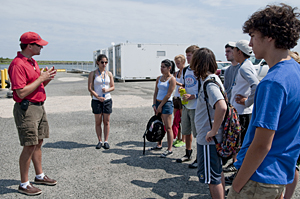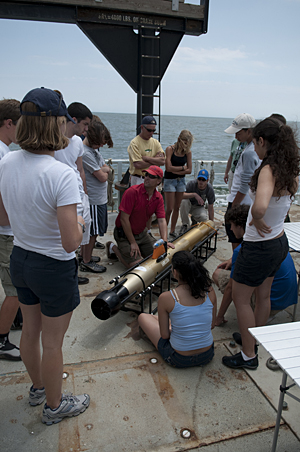- Rozovsky wins prestigious NSF Early Career Award
- UD students meet alumni, experience 'closing bell' at NYSE
- Newark Police seek assistance in identifying suspects in robbery
- Rivlin says bipartisan budget action, stronger budget rules key to reversing debt
- Stink bugs shouldn't pose problem until late summer
- Gao to honor Placido Domingo in Washington performance
- Adopt-A-Highway project keeps Lewes road clean
- WVUD's Radiothon fundraiser runs April 1-10
- W.D. Snodgrass Symposium to honor Pulitzer winner
- New guide helps cancer patients manage symptoms
- UD in the News, March 25, 2011
- For the Record, March 25, 2011
- Public opinion expert discusses world views of U.S. in Global Agenda series
- Congressional delegation, dean laud Center for Community Research and Service program
- Center for Political Communication sets symposium on politics, entertainment
- Students work to raise funds, awareness of domestic violence
- Equestrian team wins regional championship in Western riding
- Markell, Harker stress importance of agriculture to Delaware's economy
- Carol A. Ammon MBA Case Competition winners announced
- Prof presents blood-clotting studies at Gordon Research Conference
- Sexual Assault Awareness Month events, programs announced
- Stay connected with Sea Grant, CEOE e-newsletter
- A message to UD regarding the tragedy in Japan
- More News >>
- March 31-May 14: REP stages Neil Simon's 'The Good Doctor'
- April 2: Newark plans annual 'wine and dine'
- April 5: Expert perspective on U.S. health care
- April 5: Comedian Ace Guillen to visit Scrounge
- April 6, May 4: School of Nursing sponsors research lecture series
- April 6-May 4: Confucius Institute presents Chinese Film Series on Wednesdays
- April 6: IPCC's Pachauri to discuss sustainable development in DENIN Dialogue Series
- April 7: 'WVUDstock' radiothon concert announced
- April 8: English Language Institute presents 'Arts in Translation'
- April 9: Green and Healthy Living Expo planned at The Bob
- April 9: Center for Political Communication to host Onion editor
- April 10: Alumni Easter Egg-stravaganza planned
- April 11: CDS session to focus on visual assistive technologies
- April 12: T.J. Stiles to speak at UDLA annual dinner
- April 15, 16: Annual UD push lawnmower tune-up scheduled
- April 15, 16: Master Players series presents iMusic 4, China Magpie
- April 15, 16: Delaware Symphony, UD chorus to perform Mahler work
- April 18: Former NFL Coach Bill Cowher featured in UD Speaks
- April 21-24: Sesame Street Live brings Elmo and friends to The Bob
- April 30: Save the date for Ag Day 2011 at UD
- April 30: Symposium to consider 'Frontiers at the Chemistry-Biology Interface'
- April 30-May 1: Relay for Life set at Delaware Field House
- May 4: Delaware Membrane Protein Symposium announced
- May 5: Northwestern University's Leon Keer to deliver Kerr lecture
- May 7: Women's volleyball team to host second annual Spring Fling
- Through May 3: SPPA announces speakers for 10th annual lecture series
- Through May 4: Global Agenda sees U.S. through others' eyes; World Bank president to speak
- Through May 4: 'Research on Race, Ethnicity, Culture' topic of series
- Through May 9: Black American Studies announces lecture series
- Through May 11: 'Challenges in Jewish Culture' lecture series announced
- Through May 11: Area Studies research featured in speaker series
- Through June 5: 'Andy Warhol: Behind the Camera' on view in Old College Gallery
- Through July 15: 'Bodyscapes' on view at Mechanical Hall Gallery
- More What's Happening >>
- UD calendar >>
- Middle States evaluation team on campus April 5
- Phipps named HR Liaison of the Quarter
- Senior wins iPad for participating in assessment study
- April 19: Procurement Services schedules information sessions
- UD Bookstore announces spring break hours
- HealthyU Wellness Program encourages employees to 'Step into Spring'
- April 8-29: Faculty roundtable series considers student engagement
- GRE is changing; learn more at April 15 info session
- April 30: UD Evening with Blue Rocks set for employees
- Morris Library to be open 24/7 during final exams
- More Campus FYI >>
9:48 a.m., July 27, 2009----Connor Armstrong applied to TIDE Camp, held July 6-18, because he wanted to get an in-depth look at Delaware Bay. By the end of the two-week camp, the high schooler said that's definitely what he got.
“We learned everything and more than I was expecting,” he said of the camp hosted by the University of Delaware's College of Earth, Ocean, and Environment (CEOE) and Delaware Sea Grant College Program.
Armstrong, from Potomac, Md., was one of 10 high school students from here in Delaware and around the country who took part in the second annual camp. TIDE, short for Taking an Interest in Delaware's Estuary, is aimed at introducing students to the study of the scientific processes that occur at and along the coast.
With that goal in mind, the students spent the time at camp doing things such as taking part in a daylong research cruise, visiting state-of-the-art research labs, touring a marsh, interacting with a variety of faculty members, and studying wildlife at the beach. The field trips and lectures taught them about topics such as marine animals, tides, habitat loss, species adaptation, wind power, and climate change.
Armstrong's favorite activity? When the students worked in groups to build their own remotely operated vehicles (ROVs), machines used by scientists to study life on the ocean floor. The students received all the materials they needed -- PVC tubing, propellers, motors, and an underwater video camera -- and were asked to do everything from constructing the vehicles' frames to wiring the motors. Then they got to test them in the pool at the Carpenter Sports Building.
“It was tough doing all the trials and figuring out the wires, but it was fun,” he said. “We learned how sophisticated and really cool all the technology is behind all the science.”
Camper Cansu Culha, of Derwood, Md., also said she found the ROV exercise challenging but a good time, and very rewarding. “It was fun how all of our minds came together to form a robot.”
Another popular project involved beach profiling, in which the students took measurements of the beach and did calculations to see how its shape had changed over time.
“Since most of their first impressions of the ocean is going to the beach, I think it really resonated with them,” said Dana Veron, a research faculty member who organized the camp with CEOE Assistant Dean Frank Newton.
Veron, who compiled the camp's curriculum, said she wanted the students to not only see what it's like to be a marine scientist but to also understand that different academic disciplines interact during the scientific process.
One of the many activities to demonstrate that idea was the 12-hour cruise aboard UD's 146-foot ship, R/V Hugh R. Sharp. On the cruise, the students learned about the university's autonomous underwater vehicle, a piece of equipment operated by Art Trembanis, assistant professor of geology, that glides underwater and gathers information such as water quality data. They also helped Associate Professor of Oceanography Doug Miller dredge the ocean floor and got to meet all the creatures once the net came to the surface.
“We saw a ton of horseshoe crabs,” said camper Jason Truong, adding that marine science is “massive, you can do almost anything -- geology, biology, chemistry....”
Truong, from Philadelphia, and the other campers had to demonstrate an interest in marine science and show they have solid math and science skills in their camp applications.
For these science lovers, it was an amazing two weeks. “It's a great opportunity for any person,” Truong said. “If they can work hard, they can learn a lot.”
For more about the TIDE Camp program, visit the program Web site.
To learn about Delaware Sea Grant or CEOE, visit the Web sites.
Photos by Evan Krape




